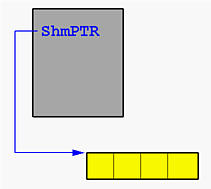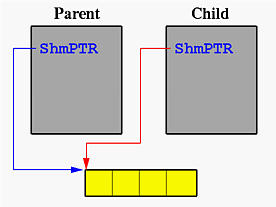
The following main function runs as a server. It uses IPC_PRIVATE to request a private shared memory. Since the client is the server's child process created after the shared memory has been created and attached, the child client process will receive the shared memory in its address space and as a result no shared memory operations are required. Click here to download a copy of this file (shm-01.c).
#include <stdio.h>
#include <stdlib.h>
#include <sys/types.h>
#include <sys/ipc.h>
#include <sys/shm.h>
void ClientProcess(int []);
void main(int argc, char *argv[])
{
int ShmID;
int *ShmPTR;
pid_t pid;
int status;
if (argc != 5) {
printf("Use: %s #1 #2 #3 #4\n", argv[0]);
exit(1);
}
ShmID = shmget(IPC_PRIVATE, 4*sizeof(int), IPC_CREAT | 0666);
if (ShmID < 0) {
printf("*** shmget error (server) ***\n");
exit(1);
}
printf("Server has received a shared memory of four integers...\n");
ShmPTR = (int *) shmat(ShmID, NULL, 0);
if ((int) ShmPTR == -1) {
printf("*** shmat error (server) ***\n");
exit(1);
}
printf("Server has attached the shared memory...\n");
ShmPTR[0] = atoi(argv[1]);
ShmPTR[1] = atoi(argv[2]);
ShmPTR[2] = atoi(argv[3]);
ShmPTR[3] = atoi(argv[4]);
printf("Server has filled %d %d %d %d in shared memory...\n",
ShmPTR[0], ShmPTR[1], ShmPTR[2], ShmPTR[3]);
printf("Server is about to fork a child process...\n");
pid = fork();
if (pid < 0) {
printf("*** fork error (server) ***\n");
exit(1);
}
else if (pid == 0) {
ClientProcess(ShmPTR);
exit(0);
}
wait(&status);
printf("Server has detected the completion of its child...\n");
shmdt((void *) ShmPTR);
printf("Server has detached its shared memory...\n");
shmctl(ShmID, IPC_RMID, NULL);
printf("Server has removed its shared memory...\n");
printf("Server exits...\n");
exit(0);
}
void ClientProcess(int SharedMem[])
{
printf(" Client process started\n");
printf(" Client found %d %d %d %d in shared memory\n",
SharedMem[0], SharedMem[1], SharedMem[2], SharedMem[3]);
printf(" Client is about to exit\n");
}
This program asks for a shared memory of four integers and attaches this shared memory segment to its address space. Pointer ShmPTR points to the shared memory segment. After this is done, we have the following:

Then, this program forks a child process to run function ClientProcess(). Thus, two identical copies of address spaces are created, each of which has a variable ShmPTR whose value is a pointer to the shared memory. As a result, the child process has already known the location of the shared memory segment and does not have to use shmget() and shmat(). This is shown below:

The parent waits for the completion of the child. For the child, it just retrieves the four integers, which were stored there by the parent before forking the child, prints them and exits. The wait() system call in the parent will detect this. Finally, the parent exits.